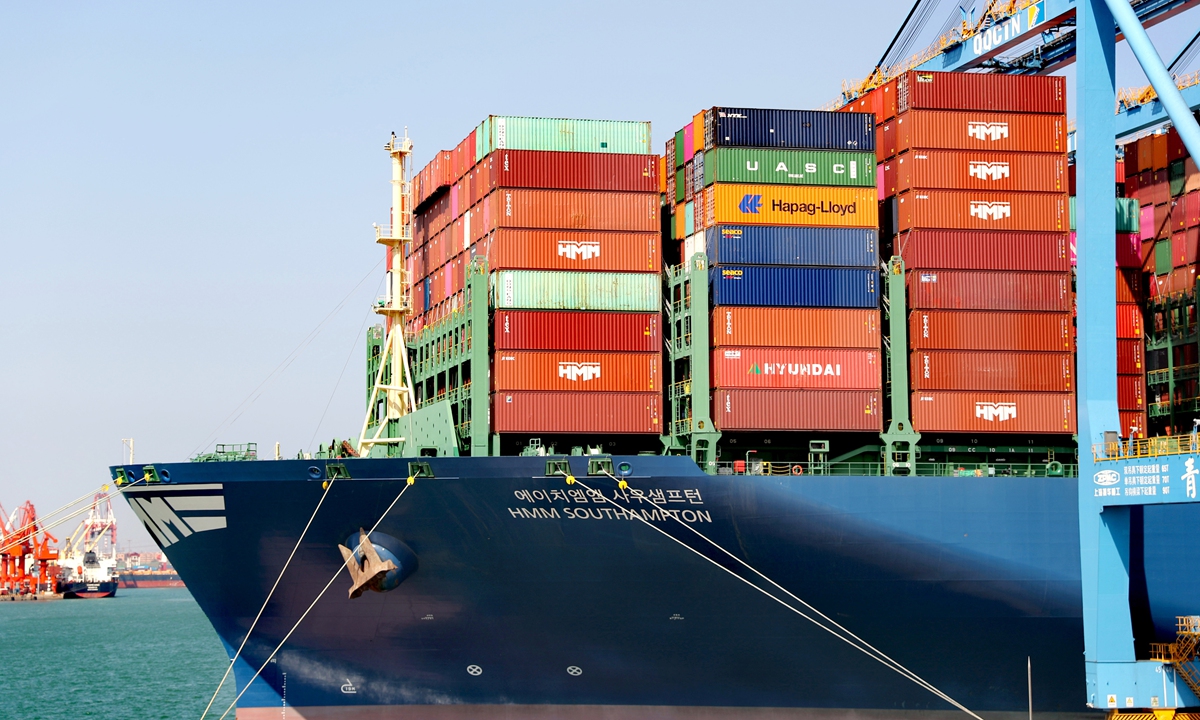China-US cargo rates drop from record highs in boost for bilateral trade
Declines will support trade growth but costs remain high: analysts

A ship loading foreign trade goods at Qingdao Port Fully Automated Container Terminal in East China's Shandong Province on Wednesday. By the end of September, more than 310 shipping lines have been opened at Shangdong Port thanks to the thriving operations driven by robust foreign trade. Photo: cnsphoto
After over a year of constant gains, skyrocketing freight rates on routes between China and the US have eased in the past month, in some cases by as much as half, according to industry insiders, who said that the declines will likely boost bilateral trade - especially China's exports to the US.
The significant drop, the first time since last year, came after easing market speculation, lower demand for shipping as well as regulations to rein in sky-high rates, industry analysts noted.
Industry data showed that the sea freight rate from China to the West Coast of North America fell from $20,586 per 40-foot container in early September to $16,004, down about 22 percent, and the rate from China to the East Coast of North America dropped from $22,173 to $19,421.
In January 2020, the rate for an ordinary container from Ningbo, East China's Zhejiang Province to Los Angeles was more than $1,000, but the price exceeded $20,000 in August before it started dropping.
Traders and industry experts told the Global Times on Monday that there are several reasons for the decline, including shrinking demand and easing market speculation.
While shipping capacity is rising, power curbs have disrupted shipments from domestic factories, reducing the demand for short-term futures, Huang Zhixiang, CEO with a logistics company based in Shanghai, told the Global Times on Monday.
Before the drop on freight rate, cabins had become a financial product that the prices were speculated by the market in the early stage to a very high level, according to Huang.
An industry insider who has been in the cross-border trading business for years told the Global Times on Monday that there had been much speculation over routes between China and the US, which pushed up rates for containers and shipping services.
"But that's eased due to production suspension in many factories after power curbs," said the insider, who spoke on the condition of anonymity.
Some traders also want to sell their pre-ordered containers and cabins after shipping companies expanded services to cover the demand, the person said.
The world's third-largest container carrier, CMA CGM, said recently that it had capped spot rates for ocean freight for the next five months, after rising pressure from customers and regulators, who were worried that global trade disruptions had pushed shipping costs too high, according to media reports. Other shipping companies such as Maersk also announced rate cuts.
Recently, China's Ministry of Transport, the US Federal Maritime Commission and the EU held a regulatory summit, where sky-high ocean freight rates were a major topic of discussion, media reports said.
Shipping lines are considering long-term business development, so they also began to reduce rates. Between May and September, freight rates soared due to congestion at some terminals and made it difficult for traders to find a container, which led to a weakening of demand, Wu Minghua, a veteran industry analyst, told the Global Times on Monday.
While rising rates discouraged traders and factory owners from taking new orders, the recent declines could change the situation.
"Recently, there have been more people delivering goods than in previous terms, because they are afraid of further price hikes," a manager with a Shenzhen-based international logistics company told the Global Times on Monday.
"The dropping freight rates are definitely good," a trader from Shanghai said on Monday, noting that he has started taking new orders this month after many months of refusing them.
While lower freight rates are encouraging, concerns persist about how long the declines will last, given lingering US port congestion and tight container supplies, Wu said, adding that rates may stay high until early next year.



